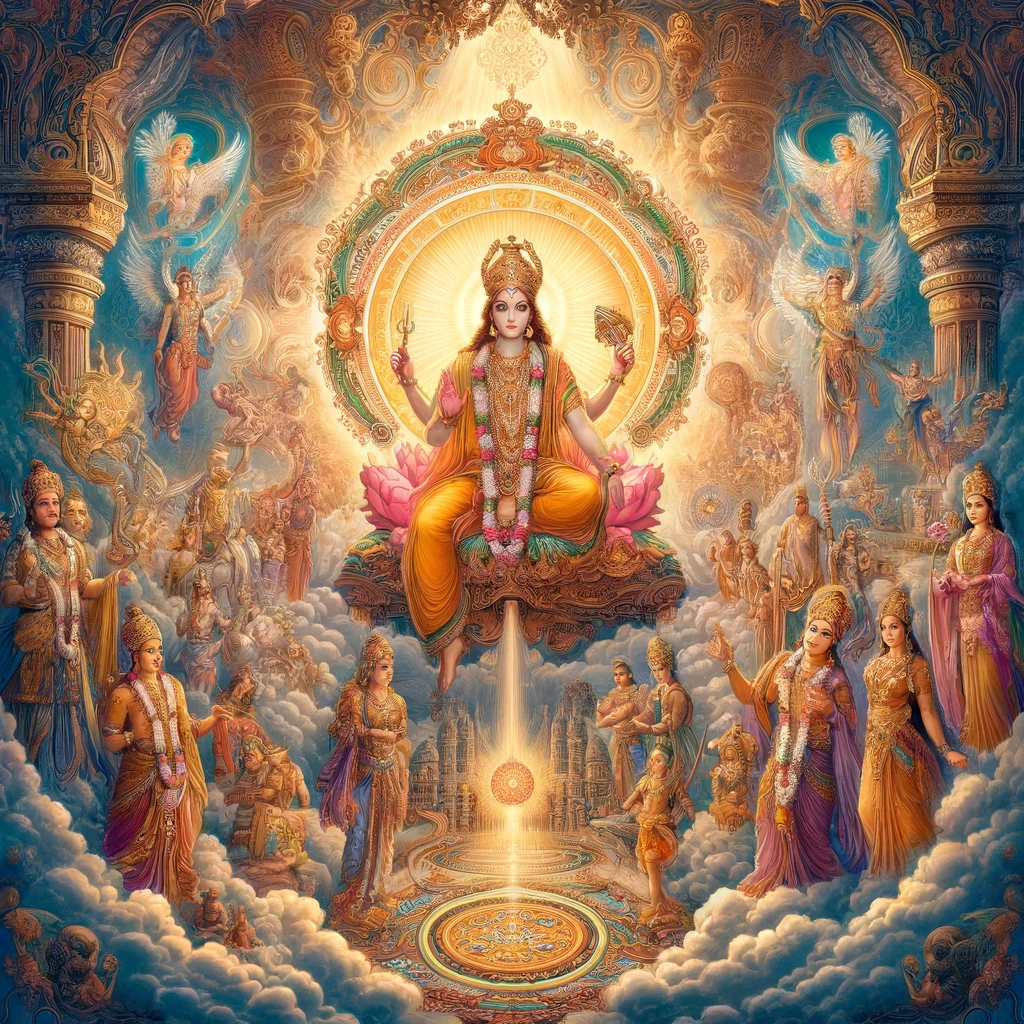ಪದ್ಮನಾಭಃ ಅರವಿಂದಾಕ್ಷಃ ಪದ್ಮಗರ್ಭಃ ಶರೀರಭೃತ್
ಮಹರ್ದ್ಧಿಃ ಋದ್ಧಃ ವೃದ್ಧಾತ್ಮಾ ಮಹಾಕ್ಷಃ ಗರುಡದ್ವಜಃ || 38 ||
padmanābhaḥ araviṃdākṣaḥ padmagarbhaḥ śarīrabhṛt
maharddhiḥ ṛddhaḥ vṛddhātmā mahākṣaḥ garuḍadvajaḥ || 38 ||
padmanābhaḥ (ಪದ್ಮನಾಭಃ)
Before creation, during the time of dissolution, the entire universe merges within the Almighty. At the time of creation, it emerges from the navel of the Almighty in the form of a lotus. The universe is created in the form of a cosmic egg or a lotus bud. This lotus-shaped universe has fourteen petals, which are the fourteen worlds. Thus, the Almighty, who creates the lotus-shaped universe from his navel, is Padmanabha.
araviṃdākṣaḥ (ಅರವಿಂದಾಕ್ಷಃ)
Aravinda means petals. As mentioned above, the Almighty created the universe in the form of a lotus bud; when that lotus bloomed, it became the fourteen worlds; thereafter, He Himself filled the bloomed universe. Such is the Almighty Aravindaksha.
'Ravi' means the sun, 'Aravi' means darkness; 'da' means 'to burn' or 'destroy'; 'aksha' means eye. Therefore, Aravindaksha means the one who has given the world two eyes in the form of the sun and the moon that destroy darkness. Thus, the Almighty Aravindaksha removes the darkness inside and outside us.
padmagarbhaḥ (ಪದ್ಮಗರ್ಭಃ)
Before creation, the entire universe and all living beings existed in a subtle form within the womb of the Almighty, and at the time of creation, everything emerges from His navel in the form of a lotus. Thus, the Almighty, who carries the entire universe in His womb, is Padmagarbha. The Almighty, standing within the womb of the four-faced (Brahma) and directing this creation, is Padmagarbha.
śarīrabhṛt (ಶರೀರಭೃತ್)
Sharirabhrit means the one who sustains the body. The Almighty enters within us along with the god of life, which is 'birth,' and His departure from our body is 'death.' When the Almighty leaves our body, our life force flies away; this body becomes a corpse.
Another meaning of the body is the universe. Thus, the Almighty, who sustains our body and the entire universe, perpetually sustains the eternal souls. Such is the Almighty Sharirabhrit.
maharddhiḥ (ಮಹರ್ದ್ಧಿಃ)
Maharddhi means the pinnacle of perfection. There are two types of perfection; one is relative perfection and the other is absolute or infinite perfection. Filling a pot with water makes it full, but the perfection of the Almighty is like the ocean (here, the ocean is just a metaphor); it is infinite perfection.
ṛddhaḥ (ಋದ್ಧಃ)
The one who is filled with all riches is Riddha. Even a precious herb is called riddha; similarly, rice mixed with pounded grains and nutritious elements is also riddha. In the herb, in the pounded rice, there lies the special splendor of the Almighty. He is complete, hence He is Riddha.
vṛddhātmā (ವೃದ್ಧಾತ್ಮಾ)
The Almighty is imperceptible to the senses. His body is filled everywhere like the sky. The difference between the sky and the Almighty is that the sky does not have a soul, but the Almighty does. The body of the Almighty is not made of the five elements. It is a body made of knowledge and bliss. Only when a person understands his true nature through his efforts does he understand this fact. The color and form of the Almighty are imbued with knowledge and bliss. He is an eternally filled form. Thus, the Almighty, who is omnipresent with a body and soul of knowledge and bliss, is Vriddhatma.
Elders mean those whose heads are ripened. Here, the head refers to the inner head. To ripen means to reach the pinnacle of knowledge; hence, Vriddha means a sage. Thus, the Almighty, who is Himself a complete sage and loves those with knowledge, is Vriddhatma.
mahākṣaḥ (ಮಹಾಕ್ಷಃ)
The one who has eyes everywhere; the one with eyes omnipresent; it is impossible for any action to occur without the knowledge of the Almighty. The Almighty possesses omnipresent senses.
garuḍadvajaḥ (ಗರುಡದ್ವಜಃ)
The one who rides and frolics on Garuda. The worship of the many forms of the Almighty mounted on Garuda is prevalent among us. One such form is "Shrikara," an idol of the Almighty mounted on Garuda, dispensing gold with two hands. Here, "Su-varna" means the knowledge to understand the Almighty through letters, the ultimate letter being the Almighty. The form that gives us the knowledge of such an Almighty is the state of being mounted on Garuda.
The ancients identified many powers that control our body. Mainly, four Purushas control our body. Shiva, the 'Sharirapurusha,' controls the body; Shesha, the 'Chandapurusha,' controls our speech by managing the pranamaya kosha; Garuda, the 'Veda Purusha,' controls our manomaya kosha. Therefore, Garuda symbolizes "Vedic knowledge." Garuda Dhwaja means the one who rides directly on the Vedas. To know such an Almighty, the only way available to us is the knowledge of the Vedas.


